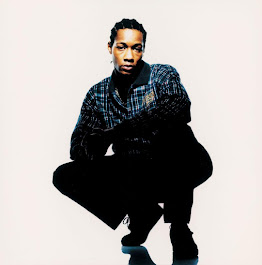 Being a local DJ and record collector trained his ears to what makes people move, and his quest to perfect his own type of funk has been nonstop since. In any interview Quik is swift to name his biggest musical inspirations; Curtis Mayfield, Zapp, The Ohio Players, Prince. Dense and jazzy funk music was his north star. To entertain was always his mission. Quik himself has stated that Safe + Sound was when he hit his stride as a sound bender. Live session players were orchestrated by him as he crawled under every mixing board he could find to tweak the wires until everything was to his liking. Rhythm-al-ism was a dive in the deep end of everything he truly loved without the weight of a hardcore hip-hop persona restraining him. Carrying the responsibilities of an MC-producer hybrid means in which you can show your emotional range in more shades than anyone around you. All the sadness can be compressed into melancholy chord progressions, the anxiety of scheming your way home every night in a tightly-wound rhythm section. Unexpected strikes of genius are tucked in different sections of every track. The liquidy warble of guitars (word to the God, Robert Bacon) and synths on the opening of “No Doubt”, the talkbox on “I Useta Know Her”, the dropouts on “Speed”. “Whateva U Know” is a jazz club dressed from floor to ceiling with velvet and fresh flowers hiding a king sized waterbed center stage for Quik to make his female companions dreams come to life. There’s a nonlinear freedom weaved into every decibel from intro to outro. There’s enough of a variation to keep your head swiveling, guided by a steady diet of low end bass lines that nudge you forward.
Being a local DJ and record collector trained his ears to what makes people move, and his quest to perfect his own type of funk has been nonstop since. In any interview Quik is swift to name his biggest musical inspirations; Curtis Mayfield, Zapp, The Ohio Players, Prince. Dense and jazzy funk music was his north star. To entertain was always his mission. Quik himself has stated that Safe + Sound was when he hit his stride as a sound bender. Live session players were orchestrated by him as he crawled under every mixing board he could find to tweak the wires until everything was to his liking. Rhythm-al-ism was a dive in the deep end of everything he truly loved without the weight of a hardcore hip-hop persona restraining him. Carrying the responsibilities of an MC-producer hybrid means in which you can show your emotional range in more shades than anyone around you. All the sadness can be compressed into melancholy chord progressions, the anxiety of scheming your way home every night in a tightly-wound rhythm section. Unexpected strikes of genius are tucked in different sections of every track. The liquidy warble of guitars (word to the God, Robert Bacon) and synths on the opening of “No Doubt”, the talkbox on “I Useta Know Her”, the dropouts on “Speed”. “Whateva U Know” is a jazz club dressed from floor to ceiling with velvet and fresh flowers hiding a king sized waterbed center stage for Quik to make his female companions dreams come to life. There’s a nonlinear freedom weaved into every decibel from intro to outro. There’s enough of a variation to keep your head swiveling, guided by a steady diet of low end bass lines that nudge you forward.
With his lyrics he transports himself to environments where looking over his shoulder is unnecessary; grown folk house parties, backyard reunions, late nights with a rotating cast of lovers. The subtle quirks that made him stick out were flamboyantly pushed to the limit; breathless flows (“Rhythm-al-ism (Intro)”), tipsy two-step classics (“We Still Party”), clear eyed retellings of his own life (“I Useta Know Her”), and adventurous takes on other genres (“Bombudd II”). Quik’s delivery is bouncy and confident, but never as much as AMG or Suga Free, who act as dynamic sparks in the frayless tapestry of guitars and drum breaks. Whenever the spotlight hits his greased ponytail, Suga warps from man into maniac yelping from one disrespectful anecdote to another. Snoop and Nate Dogg act as foils to his unhinged blasts easing so deep into the fabric of the “Medley For The V” beat they nearly disappear. There’s even a moment where yearning for childlike innocence (as much as Quik’s horny ass could muster) is given a place to exist on the sultry “Thinkin’ Bout U”. Never plainly stated but peace of mind was Quik personal white whale. In interviews he’d spoken about the stream of tragedies surrounding every major moment of his life. On “You’z A Gangsta” you hear the annoyance with the extracurricular situations that have saddled alongside his fame. Murder, nefarious plots from family, equipment theft, label issues; he could never catch a break. With that at the forefront you see how becoming one with a studio to create a dream world where the liquor never stops and speakers always knock made him feel the most alive.
What hamstrings this album from being the top of Quik’s catalog is the very thing that makes it special; it’s too comfortable. On the production end a true explosion of creativity is investigated, but the lyrics return to the same rotation of sex and partying. An all-world level word bank makes it seem like things are more complicated, but at it’s core a warm refuge is sought. Do I want Quik to break down geopolitical theory like Paris? Nah, but his personal life and storytelling are at a level above anyone working in this time and for decades to come that leaning into his inner Slick Rick instead of giving space to every homeboy he can fit in a recording booth would pay dividends. None of the associate features are show stopping clunkers (a bonus point in his favor compared to 2Pac or Ice Cube) but Quik would rather play down the double edged star power he holds and spread it to his people. Playing the man behind the curtain brings a palpable joy to his rapping, letting him float through his personal dreamland unbothered by too many eyes nitpicking his every move. It may not be the globally adored classic that Quik Is The Name has become, but it’s the most representative of everything Quik stands for; the soul rattling beauty of hip-hop music.








No comments:
Post a Comment